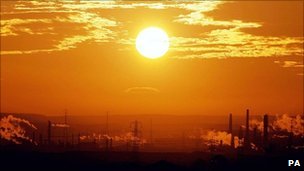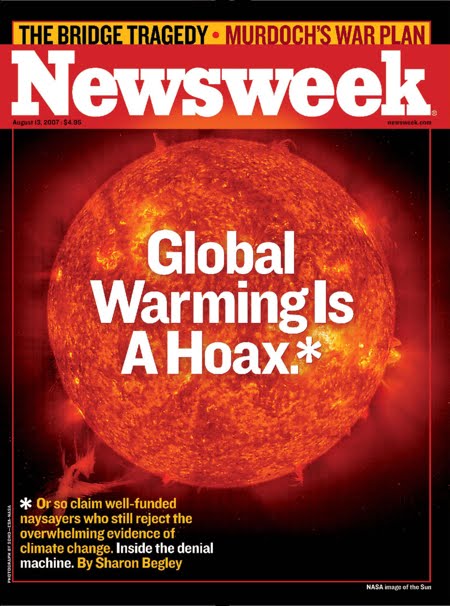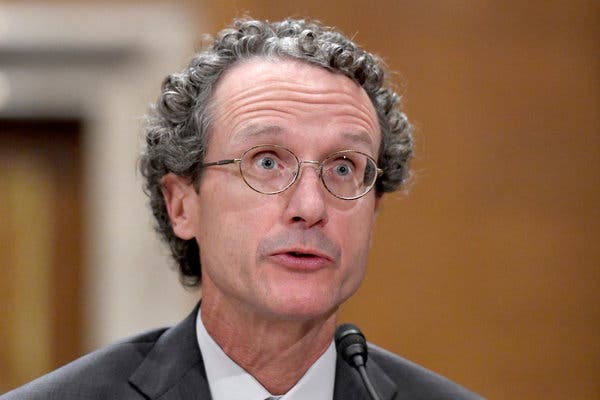

is a vast machinery out there that has been working overtime throughout the past 14 years or so to muddle the facts surrounding global warming. It's not a consipiracy.....the facts are well documented.
It's been longer than 14 years!
source:
The Guardian
Exxon knew of climate change in 1981, email says – but it funded deniers for 27 more years
A newly unearthed missive from Lenny Bernstein, a climate expert with the oil firm for 30 years, shows concerns over high presence of carbon dioxide in enormous gas field in south-east Asia factored into decision not to tap it
ExxonMobil, the world’s biggest oil company, knew as early as 1981 of climate change – seven years before it became a public issue, according to a newly discovered email from one of the firm’s own scientists. Despite this the firm spent millions over the next 27 years to promote climate denial.
The email from Exxon’s in-house climate expert provides evidence the company was aware of the connection between fossil fuels and climate change, and the potential for carbon-cutting regulations that could hurt its bottom line, over a generation ago – factoring that knowledge into its decision about an enormous gas field in south-east Asia. The field, off the coast of Indonesia, would have been the single largest source of global warming pollution at the time.
“Exxon first got interested in climate change in 1981 because it was seeking to develop the Natuna gas field off Indonesia,” Lenny Bernstein, a 30-year industry veteran and Exxon’s former in-house climate expert, wrote in the email. “This is an immense reserve of natural gas, but it is 70% CO2,” or carbon dioxide, the main driver of climate change.
However, Exxon’s public position was marked by continued refusal to acknowledge the dangers of climate change, even in
response to appeals from the Rockefellers, its founding family, and its continued financial support for climate denial. Over the years, Exxon
spent more than $30m on thinktanks and researchers that promoted climate denial, according to Greenpeace.
Exxon said on Wednesday that it now acknowledges the risk of climate change and does not fund climate change denial groups.
Some climate campaigners have likened the industry to the conduct of the tobacco industry which for decades resisted the evidence that smoking causes cancer.
In the email Bernstein, a chemical engineer and climate expert who spent 30 years at Exxon and Mobil and was a lead author on two of the United Nations’ blockbuster IPCC climate science reports, said climate change first emerged on the company’s radar in 1981, when the company was considering the development of south-east Asia’s biggest gas field, off Indonesia.
That was seven years ahead of other oil companies and the public, according to Bernstein’s account.
Climate change was largely confined to the realm of science until 1988, when the climate scientist James Hansen told Congress that global warming was caused by the buildup of greenhouse gases in the atmosphere, due to the burning of fossil fuels.
By that time, it was clear that developing the Natuna site would set off a huge amount of climate change pollution – effectively a “carbon bomb”, according to Bernstein.
“When I first learned about the project in 1989, the projections were that if Natuna were developed and its CO2 vented to the atmosphere, it would be the largest point source of CO2 in the world and account for about 1% of projected global CO2 emissions. I’m sure that it would still be the largest point source of CO2, but since CO2 emissions have grown faster than projected in 1989, it would probably account for a smaller fraction of global CO2 emissions,” Bernstein wrote.
The email was written in response to an inquiry on business ethics from the Institute for Applied and Professional Ethics at Ohio University.
“What it shows is that Exxon knew years earlier than James Hansen’s testimony to Congress that climate change was a reality; that it accepted the reality, instead of denying the reality as they have done publicly, and to such an extent that it took it into account in their decision making, in making their economic calculation,” the director of the institute, Alyssa Bernstein (no relation), told the Guardian.
“One thing that occurs to me is the behavior of the tobacco companies denying the connection between smoking and lung cancer for the sake of profits, but this is an order of magnitude greater moral offence, in my opinion, because what is at stake is the fate of the planet, humanity, and the future of civilisation, not to be melodramatic.”
Bernstein’s response, first posted on the institute’s website last October, was released by the Union of Concerned Scientists on Wednesday as part of a report on climate disinformation promoted by companies such as ExxonMobil, BP, Shell and Peabody Energy,
called the Climate Deception Dossiers.
Asked about Bernstein’s comments, Exxon said climate science in the early 1980s was at a preliminary stage, but the company now saw climate change as a risk.
“The science in 1981 on this subject was in the very, very early days and there was considerable division of opinion,” Richard Keil, an Exxon spokesman, said. “There was nobody you could have gone to in 1981 or 1984 who would have said whether it was real or not. Nobody could provide a definitive answer.”
He rejected the idea that Exxon had funded groups promoting climate denial. “I am here to talk to you about the present,” he said. “We have been factoring the likelihood of some kind of carbon tax into our business planning since 2007. We do not fund or support those who deny the reality of climate change.”
Exxon, unlike other companies and the public at large in the early 1980s, was already aware of climate change – and the prospect of regulations to limit the greenhouse gas emissions that cause climate change, according to Bernstein’s account.
“In the 1980s, Exxon needed to understand the potential for concerns about climate change to lead to regulation that would affect Natuna and other potential projects. They were well ahead of the rest of industry in this awareness. Other companies, such as Mobil, only became aware of the issue in 1988, when it first became a political issue,” he wrote.
“Natural resource companies – oil, coal, minerals – have to make investments that have lifetimes of 50-100 years. Whatever their public stance, internally they make very careful assessments of the potential for regulation, including the scientific basis for those regulations,” Bernstein wrote in the email.
Naomi Oreskes, a Harvard University professor who researches the history of climate science, said it was unsurprising Exxon would have factored climate change in its plans in the early 1980s – but she disputed Bernstein’s suggestion that other companies were not. She also took issue with Exxon’s assertion of uncertainty about the science in the 1980s, noting the National Academy of Science describing a consensus on climate change from the 1970s.
The White House and the National Academy of Sciences came out with reports on climate change in the 1970s, and government scientific agencies were studying climate change in the 1960s, she said. There were also a number of major scientific meetings on climate change in the 1970s.
“I find it difficult to believe that an industry whose business model depends on fossil fuels could have been completely ignoring major environmental reports, major environmental meetings taken place in which carbon dioxide and climate change were talked about,” she said in an interview with the Guardian.
The East Natuna gas field, about 140 miles north-east of the Natuna islands in the South China Sea and 700 miles north of Jakarta, is the biggest in south-east Asia, with about 46tn cubic ft (1.3tn cubic metres) of recoverable reserves.
However, Exxon did not go into production on the field.
Bernstein writes in his email to Ohio University: “Corporations are interested in environmental impacts only to the extent that they affect profits, either current or future. They may take what appears to be altruistic positions to improve their public image, but the assumption underlying those actions is that they will increase future profits. ExxonMobil is an interesting case in point.”
Bernstein, who is now in his mid-70s, spent 20 years as a scientist at Exxon and 10 years at Mobil. During the 1990s he headed the science and technology advisory committee of the Global Climate Coalition, an industry group that lobbied aggressively against the scientific consensus around the causes of climate change.
However, GCC climate experts accepted the impact of human activity on climate change in their internal communications as early as 1995, according to a document filed in a 2009 lawsuit and included in the UCS dossier.
The document, a 17-page primer on climate science produced by Bernstein’s advisory committee, discounts the alternate theories about the causes of climate change promoted by climate contrarian researchers such as
Willie Soon, who was partly funded by Exxon.
“The contrarian theories raise interesting questions about our total understanding of climate processes, but they do not offer convincing arguments against the conventional model of greenhouse gas emission-induced climate change,” the advisory committee said.
The 1995 primer was never released for publication. A subsequent version, which was publicly distributed in 1998, removed the reference to “contrarian theories”, and continued to dispute the science underlying climate change.
Kenneth Kimmel, the president of the Union of Concerned Scientists, said ExxonMobil and the other companies profiled in its report had failed to take responsibility about the danger to the public of producing fossil fuels.
“Instead of taking responsibility, they have either directly – or indirectly through trade and industry groups – sown doubt about the science of climate change and fought efforts to cut emissions,” he wrote in a blogpost. “I believe that the conduct outlined in the UCS report puts the fossil fuel companies’ social license at risk. And once that social license is gone, it is very hard to get it back. Just look at what happened to tobacco companies after litigation finally pried open the documents that exposed decades of misinformation and deception.”
Keil, the ExxonMobil spokesman, confirmed that the company had decided not to develop Natuna, but would not comment on the reasons. “There could be a huge range of reasons why we don’t develop projects,” he said.
Full text of scientist’s email
Below is the text of an email from Lenny Bernstein to the director of the Institute for Applied and Professional Ethics at Ohio University, Alyssa Bernstein (no relation), who had asked for ideas to stimulate students for an ethics day announced by the Carnegie Council.Alyssa’s right. Feel free to share this e-mail with her. Corporations are interested in environmental impacts only to the extent that they affect profits, either current or future. They may take what appears to be altruistic positions to improve their public image, but the assumption underlying those actions is that they will increase future profits. ExxonMobil is an interesting case in point.
Exxon first got interested in climate change in 1981 because it was seeking to develop the Natuna gas field off Indonesia. This is an immense reserve of natural gas, but it is 70% CO2. That CO2 would have to be separated to make the natural gas usable. Natural gas often contains CO2 and the technology for removing CO2 is well known. In 1981 (and now) the usual practice was to vent the CO2 to the atmosphere. When I first learned about the project in 1989, the projections were that if Natuna were developed and its CO2 vented to the atmosphere, it would be the largest point source of CO2 in the world and account for about 1% of projected global CO2 emissions. I’m sure that it would still be the largest point source of CO2, but since CO2 emissions have grown faster than projected in 1989, it would probably account for a smaller fraction of global CO2 emissions.
The alternative to venting CO2 to the atmosphere is to inject it into ground. This technology was also well known, since the oil industry had been injecting limited quantities of CO2 to enhance oil recovery. There were many questions about whether the CO2 would remain in the ground, some of which have been answered by Statoil’s now almost 20 years of experience injecting CO2 in the North Sea. Statoil did this because the Norwegian government placed a tax on vented CO2. It was cheaper for Statoil to inject CO2 than pay the tax. Of course, Statoil has touted how much CO2 it has prevented from being emitted.
In the 1980s, Exxon needed to understand the potential for concerns about climate change to lead to regulation that would affect Natuna and other potential projects. They were well ahead of the rest of industry in this awareness. Other companies, such as Mobil, only became aware of the issue in 1988, when it first became a political issue. Natural resource companies – oil, coal, minerals – have to make investments that have lifetimes of 50-100 years. Whatever their public stance, internally they make very careful assessments of the potential for regulation, including the scientific basis for those regulations. Exxon NEVER denied the potential for humans to impact the climate system. It did question – legitimately, in my opinion – the validity of some of the science.
Political battles need to personify the enemy. This is why liberals spend so much time vilifying the Koch brothers – who are hardly the only big money supporters of conservative ideas. In climate change, the first villain was a man named Donald Pearlman, who was a lobbyist for Saudi Arabia and Kuwait. (In another life, he was instrumental in getting the US Holocaust Museum funded and built.) Pearlman’s usefulness as a villain ended when he died of lung cancer – he was a heavy smoker to the end.
Then the villain was the Global Climate Coalition (GCC), a trade organization of energy producers and large energy users. I was involved in GCC for a while, unsuccessfully trying to get them to recognize scientific reality. (That effort got me on to the front page of the New York Times, but that’s another story.) Environmental group pressure was successful in putting GCC out of business, but they also lost their villain. They needed one which wouldn’t die and wouldn’t go out of business. Exxon, and after its merger with Mobil ExxonMobil, fit the bill, especially under its former CEO, Lee Raymond, who was vocally opposed to climate change regulation. ExxonMobil’s current CEO, Rex Tillerson, has taken a much softer line, but ExxonMobil has not lost its position as the personification of corporate, and especially climate change, evil. It is the only company mentioned in Alyssa’s e-mail, even though, in my opinion, it is far more ethical that many other large corporations.
Having spent twenty years working for Exxon and ten working for Mobil, I know that much of that ethical behavior comes from a business calculation that it is cheaper in the long run to be ethical than unethical. Safety is the clearest example of this. ExxonMobil knows all too well the cost of poor safety practices. The Exxon Valdez is the most public, but far from the only, example of the high cost of unsafe operations. The value of good environmental practices are more subtle, but a facility that does a good job of controlling emission and waste is a well run facility, that is probably maximizing profit. All major companies will tell you that they are trying to minimize their internal CO2 emissions. Mostly, they are doing this by improving energy efficiency and reducing cost. The same is true for internal recycling, again a practice most companies follow. Its [sic] just good engineering.
I could go on, but this e-mail is long enough.































